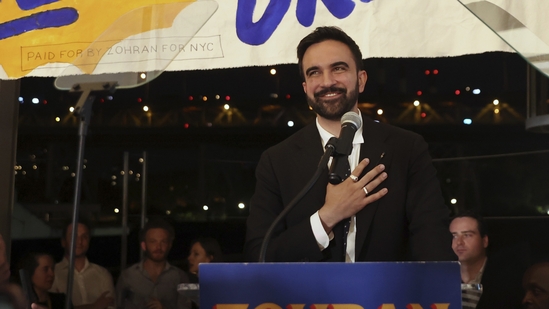Zohran Mamdani, the New York mayoral candidate of Indian origin who criticised Modi
Son of anthropologist Mahmood Mamdani and filmmaker Mira Nair, the 33-year-old democratic socialist won the Big Apple’s Democratic mayoral primary. A critic of Indian Prime Minister Modi and close to the Palestinian cause, if elected, he would become New York’s first Shia Muslim mayor. His political education was strongly influenced by his Indian parents.
New York (AsiaNews) – Yesterday Zohran Mamdani won the 2025 New York City Democratic mayoral primary, beating former New York Governor Andrew Cuomo, a sign of an important shift within the US left, where the centrist wing appears increasingly out of step.
Both of Zohran Mamdani’s parents are Indian, while at the start of this year he married illustrator Rama Duwaji, 27, born in Damascus (Syria) into a family of artists who now live in Dubai.
During the primary, answering a journalist's question, Mamdani mentioned that his father's family is originally from the State of Gujarat, where "Prime Minister Narendra Modi helped orchestrate what was a mass slaughter of Muslims in Gujarat to the extent that we don’t believe that Gujarati Muslims exist anymore.”
For him, Modi is a "someone we should consider in the same manner as Benjamin Netanyahu," that is, "a war criminal.” The reference is to the violence between Hindus and Muslims that lasted three days in 2002. At the time, Modi was Gujarat’s chief minister and was accused of not doing enough to stop the violence. Today, about 10 per cent of the state's population is Muslim.
Recently, Mamdani has also been accused of anti-Semitism. Since he was young, he has been a supporter of the Palestinian cause.
During the primary, when asked about Israel’s right to exist as a Jewish state, he said, “I believe Israel has the right to exist.” When the moderator asked, “As a Jewish state?” Mamdani replied, “As a state with equal rights. Because I’m not comfortable supporting any state that has a hierarchy of citizenship on the basis of religion or anything else.”
The 33-year-old, a self-described democratic socialist, has proposed, among other things, raising taxes on New York’s wealthiest residents to fund free buses within the city, childcare, government-run grocery stores, and rent-controlled housing.
If elected (in November), he will also be the city’s first Muslim (Shia) mayor.
Although he grew up in the United States, he was born in Kampala (Uganda) and attended his first years of school in Cape Town, South Africa, arriving in the United States at the age of seven where he was naturalised in 2018.
His political education is closely linked to his family history, in particular to his father, an Indian anthropologist and professor at Columbia University who has long been involved in post-colonial studies in Africa after living in Uganda and Tanzania, while his mother, Mira Nair, is a well-known Indian film director.
His father, Mahmood Mamdani, was born in Bombay (now Mumbai) in 1946, but grew up in Uganda, where an important Indian community emerged during British colonial rule, playing a strategic role in the local economy.
In the 1960s, during the Kennedy presidency and the decolonisation period, he went to the United States on a scholarship. He studied political science at the University of Pittsburgh, and took part in protests for the civil rights of African Americans, risking prison for his political views.
He pursued his studies at Tufts University and Harvard, where he earned a doctorate with a thesis titled Politics and Class Formation in Uganda.
In 1972, the Ugandan government led by Idi Amin expelled all Ugandans of Indian origin, including Mamdani, whose citizenship was revoked for claiming that famine in the country was man-made.
He taught at several African universities and returned to Uganda in the late 1980s after the fall of President Milton Obote, whom he had criticised. In the African country, he founded the first local think tank, the Centre for Basic Research.
Until recent years, his research focused on the development of post-colonial states, starting with the analysis of the institutional colonial state, considered a two-faced Janus, with “direct rule" in the urban areas that granted minimal rights and freedoms but excluded the majority of natives, and an "indirect rule" in rural areas, based on local traditions but applied by a "rural tribal authority" that Mamdani defines as "decentralised despotism", from which authoritarian forms of power arose, perpetuating a colonial dynamic even after the end of the foreign occupation.
In examining various African conflicts, he argues that the colonising powers imposed divisions between “indigenous” and “non-indigenous” that favoured inter-ethnic conflicts.
It is not hard to see that Zohran Mamdani’s ideas about housing justice, immigrants' rights, and racial inclusion are a legacy from his father. New York’s would-be mayor has a bachelor's degree in Africana studies.
His mother, Mira Nair, is originally from Odisha (Orissa), India. She moved to the United States at the age of 19 on a scholarship, but met her future husband in Uganda while researching for the film "Mississippi Masala".
In her work she has often touched on themes such as the intersections between cultures and social classes, focusing on the Indian diaspora, the conflicts between tradition and modernity, and the challenges of adapting to a foreign country.
14/10/2022 16:54
28/09/2017 09:32







.png)










